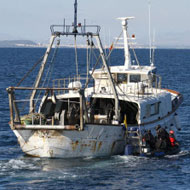CSIRO creates tool to fight illegal fishing

"...we can shine a spotlight on vessels acting suspiciously based on factors including the vessel's history, movement and whether its transmitter has been intentionally disabled."
Science agency CSIRO has developed a world-first tool to help tackle illegal fishing by alerting the authorities about suspicious vessels.
The web-based system uses data collected by satellites to monitor vessels across the globe. It identifies those behaving suspiciously using a list of behaviours associated with illegal, unregulated and unreported (IUU) fishing.
Senior scientist and co-designer Dr Chris Wilcox explained: “Almost all vessels are equipped with anti-collision devices that can be detected by satellites. Using data from these systems, we can shine a spotlight on vessels acting suspiciously based on factors including the vessel's history, movement and whether its transmitter has been intentionally disabled.
"Countries will be able to sign-up to receive notifications, or directly access the portal to search for vessels and then be provided with a report which highlights the suspicious behaviours involved."
Illegal fishing is the third most lucrative crime in the world, after weapons trafficking and drug smuggling. It is estimated that 26 million tonnes of illegal fish are caught every year, which is worth around $23 billion (£18 million). It is a particular problem in the developing world, where low capacity and funding make it difficult to tackle.
Dr Wilcox added: "As well as costing tens of billions of dollars each year, IUU fishing leads to overfishing and depletion of stocks which has the greatest impact on developing countries whose people rely on fish as their primary source of protein and income.
"As global population numbers continue to grow, combatting IUU fishing is becoming even more important to ensure future food security for the world."
The platform will officially launch in October.



 The veterinary mental health charity Vetlife is inviting the veterinary community to join it for a sponsored cold-water dip.
The veterinary mental health charity Vetlife is inviting the veterinary community to join it for a sponsored cold-water dip.